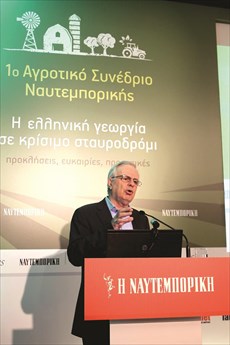A government strategy to overhaul the Greek agriculture sector has reportedly been approved by the country’s institutional creditors, with highlights being efforts to support full-time professional farmers and producers, better management of production costs and boosting farm exports.
According to relevant Agriculture Minister Vangelis Apostolou, who addressed the inaugural Agriculture Conference sponsored by “Naftemporiki” on Wednesday, full-time agriculture producers in the country are estimated at around 275,000, while an emphasis is to better support new farmers via an “Agriculture Development Program”.
“Not only do we have a plan, but we processed it in a manner to best serve Greek agriculture’s competitiveness…” he said at the Athens conference, entitled “Greek Agriculture at a Critical Crossroads”.

ΑΠΕ-ΜΠΕ
Agriculture Minister Vangelis Apostolou.
“The agreement (third bailout) with the institutions may have negative repercussions, there are, however, strategic points, for which we have agreed, and which we will promote as advantages in the effort we’re making in the farm sector,” he told participants.
On his part, main opposition New Democracy’s sector head for agricultural development and foodstuffs, Giorgos Kasapidis emphasized that at “this crossroads we have the Greek government’s traffic police putting up a ‘stop sign’ to the road ahead for Greek agriculture, due to their tax and pension plans.”
Prof. Costas Karantininis, from the Swedish University of Agricultural Sciences at Uppsala, pointed to conclusions from a Task Force-commissioned study in 2014 on Greek agriculture – which was unveiled in January 2015 by “N” – chief amongst which was the fact that one of the sector’s prime characteristics is its dependence on subsidies.
“Around 2.5 billion euros are sunk every year (into the sector), comprising around one-third of (Greek) farmers’ income, something that is, of course, not a Greek phenomenon but a characteristic of European agriculture, and in fact global agriculture,” he explained, while adding:
“Unfortunately, those getting the subsidies aren’t always those working with agriculture”.
On an innovative note, the managing director of Mediterra, which manages the highly regarded chains of Mastihashops, Yiannis Mandalas, explained how the Mastic Producers’ Union of Chios adapted and thrived in the competitive “niche” farm exports sector, saying that the difficulty was to overcome the “traditional” mindset accompanying certain brands, “as the traditional was linked with the old, resulting in tradition being an obstacle instead of a marketing tool in this case.”